Soft Skills for Resume [This Year’s In-Demand Skills By Job]
Soft skills on resumes are one of the most misunderstood concepts. You can tell by reading all the advice articles written by marketers of resume tech companies and job boards that get it wrong.
First, I hate calling these things soft skills because that word really refers to several different things and isn’t clear. But I titled it Soft Skills so you can find it and hopefully get some clarity about what they are and how to use them (or not use them) in your resume.
In this article, we’re going to cover:
The two types of skills that people often group together under the heading soft skills;
How much they matter to employers and at what stage of the hiring process;
A list of the most in-demand soft skills I’ve heard employers ask for over the years;
How many soft skills you should have on your resume; and
How to write about soft skills on your resume.
What Are Soft Skills
People usually refer to two things when using the term soft skills: transferable skills and character traits (or personal attributes). These two items are very different and should be prioritized and written about differently. I’ll get to that later. This is why I don’t like referring to them as soft skills because they’re not the same and there’s nothing soft about them.
Transferable skills are those that are not tied to a particular industry or technical knowledge base. They are not tied to a particular job and often refer to skills you have with people, information, or things. They transcend industry and job families.
Traits, on the other hand, describe the manner in which you perform a skill. These are things like high energy or attention to detail.
When people refer to soft skills they almost always are referring to transferable skills and traits.
The Difference Between Hard and Soft Skills
Both transferable skills and traits are not tied to any one job family. Hard skills, or technical skills as I like to refer to them, are rooted in a particular job family. Keep in mind that just because soft skills aren’t tied to one job, that doesn’t mean they are relevant soft skills for all jobs. Some jobs value and prioritize certain soft skills over others.
Here’s an example of what these skills could look like for a financial analyst.
A financial analyst may have the technical skill (hard skill) of building financial models. That is tied to their particular job family.
They may have the transferable skill (soft skill) of synthesizing data. This skill transcends multiple jobs and industries.
Finally, they may have the trait (soft skill) of attention to detail which is how they perform the first two skills.
Do Soft Skills Matter to Employers
The short answer is yes. While the last study I could find dates back to 2020, SHRM has done some research on this that indicates soft skills are very important to employers. I can also testify from my own recruiting experience that this is the case. When I went back through my notes from meeting with hiring managers for recruiting, 80% of the time when I would ask them about their top 3 non-negotiable skills a candidate must possess, at least one of the items was a soft skill.
Do Soft Skills Matter on a Resume
This is where the nuance of the conversation starts to happen. While yes, soft skills are important to employers, the technical expertise on your resume is what will result in employers calling you for an interview. Soft skills are usually more important at the interview stage because they’re more easily evidenced in your actions throughout the discussion.
That’s not to say that they can’t help when writing your resume though. But whether they are effective on a resume depends largely on how you choose to use them. If you’re going to add a skills section and plug some soft skills in there, you’re wasting your time.
But if you want to take the time to identify which soft skills matter most and find ways to illustrate them in your work experiences, you’ll have a powerful resume that will separate you from your peers.
Long story short, focus on technical expertise and not soft skills for your resume but incorporate soft skills into how you discuss those technical experiences. In other words, you won’t actually write the soft skill anywhere on your resume, but you’ll show evidence of it. I’ll talk about this much more in an upcoming section.
But first, let’s figure out what soft skills you may want to consider including in your resume.
Soft Skills To Put On Resume
This week I sat down and reviewed close to 100 job briefs and job descriptions for multiple kinds of roles, picked out all the soft skills that employers gave recruiters as important, and then ranked them. Here are the most in-demand soft skills this year that employers are asking for.
Communication
Adaptability
Emotional Intelligence and Interpersonal Skills
Critical Thinking and Problem Solving
Ownership Mentality
Prioritization and Time Management
Emotional Agility
Conflict Resolution
Active Listening
Work Ethic
Communication
There are few jobs that don’t require you to interact with someone, whether that be customers, colleagues, or vendors. It’s no surprise that communication continues to top the charts year after year. When you include communication skills on your resume, focus on the type of effective communication that makes the most sense for the job you want.
Communication skills are a broad category that can include persuasion, socialness, self-confidence, warmth, goodwill, openness, and so many other things. Find your unique brand of communication and show that in your resume.
Here are some communication skills synonyms:
Sociability
Extroversion
Friendliness
Gregariousness
Cordialness
Adaptability
This shouldn’t be a surprise either as many companies have had to pivot and do more with less since the 2020 pandemic. It’s been a whiplash of ups and downs for the past few years. Today, companies need people who can roll with the punches and change course quickly. Agile thinking is the keyword today.
Here are some adaptability synonyms:
Flexible
Agile
Malleable
Versatile
Interpersonal Skills, Emotional Intelligence
As we have all retreated into technology, leaders are finding fewer people with the interpersonal skills and EQ to build productive relationships and interact with others.
Some interpersonal skills synonyms include:
Social
Communicative
Accepting Feedback
Obtaining Buy-In on Ideas
Supporting Others
Critical Thinking, Problem Solving Skills
Critical thinking has been at the top of the charts for several years now. This involves how you think, process information, and formulate conclusions. Showing how you make data-driven decisions and use creativity to solve your own (and others’) problems is important.
One thing you can count on is that in every job, there will be problems and the more you solve, the more money you usually make.
Some critical thinking synonyms include:
Data-Driven Decision Making
Observation
Analytical Reasoning
Reflective Judgment
Independent Thinking
Objective Evaluation
Ownership Mentality
I’ve seen this one come on and off the top list over the years. This past year many leaders asked for candidates who took ownership of their work. They wanted people who didn’t pass the buck along but rather treated their desk (or work) as if it was their own business, combining many other skills such as problem-solving and initiative.
Showing how you own problems and solve them, how you own your own success, and how you own your personal development can go a long way in this job market.
Ownership mentality synonyms could include:
Taking Responsibility
Owning Outcomes
Accountability
Prioritization, Time Management
A lot of companies are doing more with fewer people, making time management incredibly important. Don’t confuse this with working long hours and overextending yourself without boundaries. That’s not the same.
Rather this skill is all about making efficient use of technology, staying organized, and prioritizing tasks correctly.
Here are some time management synonyms:
Organization
Multitasking
Prioritizing
Scheduling
Emotional Agility
Ok, most hiring managers don’t use this word, but it’s the best one I could find to describe what they often describe to me. Emotional agility involves the ability to read the room, react quickly to situations, and identify and meet other people’s needs. It also involves the ability to manage your own thoughts and feelings.
In short, it is having the ability to be flexible with your thoughts and feelings in order to have the appropriate response to situations around you.
Some synonyms you can think about for emotional agility include:
Awareness
Insight
Thoughtfulness
Conflict Resolution
There are two things you can count on if you’re in the workforce and it’s not death and taxes. It’s problems and conflicts with others. It’s going to happen. A lot of people don’t know how to resolve or manage conflict. They either elevate it to a manager before it’s really necessary to do so, they bottle up their feelings and hide them away, or they are overly aggressive.
Being able to respond to a situation with the appropriate amount of drama is a skill. And it’s one employers want.
Here are some conflict resolution synonyms:
Mitigate
Intercede
Reconcile
Active Listening
Listening is a hard skill to develop. Being an active listener has all kinds of benefits though. People with this skill have less miscommunication and less conflict. They are more efficient with their time by not having to chase down information more than once. This has been a highly sought after skill by employers for several years in a row.
Active listening synonyms include:
Attentive
Engaged
Mindful Listening
Conscious Listening
Work Ethic
Work ethic is about putting in the work, taking pride in that work, and achieving results because of it. It requires discipline and sometimes sacrifice. I don’t think you need to be a pushover or a “yes man” in your interviews or resume, but showing a degree of work ethic will go a long way.
Some work ethic synonyms include:
Diligent
Commitment
Dedication
Reliable
Industrious
List of Soft Skills for Resume by Job
Different job families and industries tend to favor different soft skills. While the above were the most common ones across all jobs, I thought it might be helpful to list the most popular soft skills by category as well. Here are what employers in different industries, job families, and companies look for most often.
Accounting Resume Soft Skills
For accounting and finance, here are the most commonly asked for soft skills I’ve been asked to find.
Audit Mentality (Detail Oriented)
Critical Thinking
Organization, Time Management
Communication
Stress Tolerance
Curiosity
Data Analysis
Amazon Resume Soft Skills
When reviewing jobs at Amazon, here were the most commonly asked for soft skills.
Adaptability
Problem-Solving
Customer Obsession
Data-Driven Decision Making
Communication
Ownership Mentality
Remote Resume Soft Skills
Remote jobs are unique and have their own set of challenges. You can’t walk down the hall and get advice which means you have to own your decisions, make decisions, and take the initiative to do something. It can also be more stressful because you don’t have a team around you whom you can share frustrations with or vent over lunch. It’s just you in a room with a chat box.
Here are the most sought-after soft skills for jobs that are remote.
Communication
Emotional Agility
Time Management
Initiative
Stress Tolerance
Adaptability
Construction Resume Soft Skills
If you’re in the construction industry, here are some commonly asked for soft skills.
Communication
Interpersonal Skills
Teamwork
Problem-Solving
Adaptability
Attention to Detail
Safety Consciousness
Customer Service Resume Soft Skills
For customer service roles, consider including these in your resume and interviews.
Active Listening
Communication
Conflict Resolution
Empathy
Organization
Stress Tolerance
Problem-Solving
Education Resume Soft Skills
If you’re exploring jobs in education, show these soft skills in your resume and interviews.
Communication
Social and Emotional Intelligence
Problem-Solving
Adaptability
Multitasking
Cultural Competence
Government Resume Soft Skills
For government jobs, these are the most asked for soft skills.
Communication
Active Listening
Empathy
Conflict Resolution
Diplomacy
Integrity
Healthcare Resume Soft Skills
For healthcare roles, you’ll do well to show these soft skills.
Empathy
Communication
Teamwork
Work Ethic
Stress Management
Flexibility
Multitasking
Welcoming Attitude
Human Resources Resume Soft Skills
Leaders often seek these soft skills in their HR candidates.
Critical Thinking
Organization
Communication
Confidentiality
Negotiation
Coaching and Mentoring
Conflict Resolution
Adaptability
IT Resume Soft Skills
For anything in information technology, these are frequently asked for soft skills.
Collaboration
Communication
Curiosity
Accountability
Critical Thinking
Analytical Ability
Project Management
Resourcefulness
Marketing Resume Soft Skills
I’ve worked with a lot of marketing professionals over the years and these are the mainstream soft skills employers typically ask for.
Creativity
Curiosity
Problem-Solving
Communication
Collaboration
Active Listening
Adaptability
Data Analysis
Recent Graduate Resume Soft Skills
While I highly recommend college students work as many internships as they can during school in order to build their resume, you still aren’t going to have a lot of experience to draw from unless you’re a career-changing adult. That means you’re going to have to rely on your “soft skills” even more so throughout the hiring journey.
Here are some common ones you can probably include in your resume.
Communication
Teamwork
Problem-Solving
Adaptability
Time Management
Creativity
Curiosity
Receptionist Resume Soft Skills
For those applying to receptionist jobs, here are the soft skills you may wish to illustrate.
Communication
Friendly Demeanor
Organization
Interpersonal Skills
Flexibility
Multitasking
Time Management, Prioritization
Attention to Detail
Sales Resume Soft Skills
And lastly, for anyone applying for sales jobs, here are some soft skills you should consider showing.
Confidence
Interpersonal Skills, Emotional Intelligence
Humility
Adaptability
Conversational Skills
Active Listening
Resilience
Leadership Soft Skills
If you’re applying for a leadership role, here are some specific soft skills that executives have told me they are searching for. You’ll notice that they’re not all that different from the other soft skills we’ve covered. But how you apply them in your resume examples will be different. Instead of showing them in action as an individual contributor, you’ll want to show them in your leadership style.
Communication
Interpersonal Skills
Teamwork
Motivational
Problem-Solving
Decision-Making
Conflict Resolution
Confidence
Integrity
Mentoring or Coaching
Willingness to Learn
Creativity
Emotional Intelligence
Adaptability
How to Write Soft Skills on Your Resume
Avoid the Resume Skills Section
Sadly, many articles are going to tell you to list these soft skills in a skills section on your resume. DON’T DO THAT! I can think of fewer ideas to waste space on your resume and communicate nothing.
The problem with including soft skills in a resume skills section is that it provides no context. By listing that you have active listening, that doesn’t tell me that you’re good at it. I have no context to base that on and no evidence to support it.
It’s kind of like going to one of those political campaign rallies where the candidate says we’re going to do this greatest thing ever but when asked about their plan there isn’t one. That may win elections; it won’t win you jobs.
Show, Don’t Tell
Ditch the soft skills section and instead show those soft skills in your resume bullet points. You don’t need to explicitly say them either, but instead, show examples that illustrate them in action.
Here’s what I mean. Let’s say you were in mortgage sales and you wanted to show soft skills like work ethic, organization, and communication. You could write a statement like this for one of your jobs.
Made 150 calls daily to potential customers in 6 different states to sell 4 different lending products resulting in 62% locking in rates same-day.
If you’re making 150 calls per day, that shows me your work ethic. You have 4 loan products in 6 states and you’re calling 150 people, that shows me that you must be organized. And if you got 62% of the people you spoke with to lock in rates that same day, you must be good at communicating.
That’s how it’s done. Not in a skills section with bland words. You too would be disappointed if you showed up to show and tell and the other person didn’t bring anything with them, but instead just stood up there talking. Show, don’t tell.
Limit The Number of Soft Skills Used
You don’t need to show that you have every soft skill under the sun in your resume. In fact, that would probably backfire on you. That’s why I always laugh at those lists that companies publish, “100 soft skills for your resume.”
Realistically you only need to pick 5 soft skills to show throughout your resume, definitely no more than 10. Just make sure they're the right 5-10 for your job and industry.
Use Both Transferable Skills and Traits
Don’t limit yourself to only traits. Use a blend of relevant transferable skills and traits in your resume. Show them throughout your job experiences with context and evidence.
Don’t Tailor Soft Skills
Yes, you read that correctly. I know resume writers love to preach and tailor everything. I bet it brings them in more sales. Tailoring soft skills in a resume is the most ridiculous proposition I’ve ever heard. If you’ve segmented your resume appropriately, you shouldn’t need to do anything else.
If you don’t know how to do that, start with this guide on segmented master resumes.
How to Improve Soft Skills
The great thing about soft skills is that it’s easier to develop them outside of a traditional job or internship experience. You can start developing soft skills through independent projects and through your daily interactions with others. You don’t need a job to build these skills; although, you could also develop them in a work environment. Here are some tips to develop these types of skills.
Be Honest With Yourself
Take a real hard look and be honest in your self-evaluation of these skills. Identify what skills you may be lacking and which ones may be strong.
Ask Others For Feedback
Sometimes we think we’re great at a particular skill or that we possess a particular trait, but others don’t quite see it that way. Asking other trusted confidants for feedback can help you gain an accurate picture of your soft skills.
Give Yourself Time
Traits are built through habits and many soft skills are traits. It won’t happen overnight. Give yourself the time and patience needed to develop these traits and transferable skills.
Use a Goal Tracker
There are many goal trackers and planners that incorporate goal sheets on the market. You can buy one if you want or you can keep score on a piece of paper. Sometimes the easiest way to build a new trait is to set a habit goal or repetition goal. In other words, decide on what activities will lead to this trait and make it a goal to perform that activity every day for a certain number of days.
When you complete it, check off the day in your planner or on your goal tracker.
Find a Mentor
Some of us have the luxury of having mentors at work or at school. If you don’t have this, you can always hire a mentor as well. I’ve mentored thousands of job seekers on skill development over the years and I continue to do so through job search membership private coaching. But I’m not the only mentor out there. Find someone who has done what you want to do and ask them to mentor you.
Soft Skills for Resume Recommended Reading
58 Communication Skills Synonyms
How to Add Resume Metrics to Your Resume [Even If You Don’t Have Any]
Cole Sperry has been a recruiter and resume writer since 2015, working with tens of thousands of job seekers, and hundreds of employers. Today Cole runs a boutique advisory firm consulting with dozens of recruiting firms and is the Managing Editor at OptimCareers.com.
















